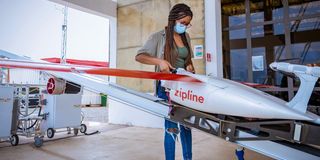Kenya to benefit from global drone vaccine delivery service

Sample of the Zipline Drone. The drone is able to deliver drugs and other medical supplies within a radius of 80km.
What you need to know:
- Zipline, an automated logistics and aircraft company, is pioneering on-demand drone delivery of priority products including emergency vaccines in Rwanda, Ghana, Nigeria, Kenya, Japan and India as well as expanding health horizons in India.
- GAVI is focused on strengthening worldwide immunisation systems through digital innovation, which is a priority among G7 and G20 countries.
Kenya is among countries that have been selected to benefit from an automated on-demand drone delivery service for health products and vaccines.
This comes after vaccine alliance GAVI launched INFUSE 2.0, an innovation scaling hub that matches investors with innovators and entrepreneurs to help scale up new ways to improve vaccination coverage in lower-income countries.
GAVI oversees procurement, allotment and distribution of vaccines to the less privileged countries.
“We are pleased to announce a new collaboration between Project Last Mile (PLM) and Gavi INFUSE, made possible by a US$1.5 million grant from The Coca-Cola Foundation to Project Last Mile.” said Adrian Ristow, the executive director of Project Last Mile.
“With Project Last Mile already having reached over 40 million lives through more than 40 projects in Africa alongside USAID, the Global Fund, PEPFAR, and the Bill & Melinda Gates Foundation, this is another exciting milestone step toward in PLM’s journey in supporting the scaling of immunisation innovation,” he said.
He pointed out that while the Covid-19 pandemic brings global health to a critical juncture, Gavi’s work stabilising disrupted health and immunisation systems is yielding promising results.
Zipline, an automated logistics and aircraft company, is pioneering on-demand drone delivery of priority products including emergency vaccines in Rwanda, Ghana, Nigeria, Kenya, Japan and India as well as expanding health horizons in India.
INFUSE 2.0 expects to secure at least US$ 500 million in private investment to promote access to new and under-used vaccines and immunisation innovations in the fight against deadly and debilitating infectious diseases.
“The pandemic has rolled back years of progress improving vaccine coverage in the world's most vulnerable countries. With millions of children now at risk of deadly, preventable diseases, we need to ensure the most promising, most scalable innovations reach the countries that need them, urgently,” said Gavi CEO Seth Berkley.
“INFUSE 2.0 can do just that, bringing together investors looking for impact with entrepreneurs who can deliver it to help protect children across the world,” he said.
Dr Berkley noted that this year GAVI is focused on strengthening worldwide immunisation systems through digital innovation, which is a priority among G7 and G20 countries.
This comes at a time the Kenya Demographic and Health Survey (KDHS) 2022 released last month by the Kenya National Bureau of Statistics showed that eight in 10 children aged 12–23 months in Kenya are fully vaccinated with the basic antigens.
“With respect to individual vaccine antigens, 97 per cent of the children have received BCG, the first dose of pentavalent, and the first dose of oral polio vaccine (OPV), and 89 per cent have received the first dose of measles, rubella (MR)vaccine.”
The researchers observed that the coverage rate for the OPV birth dose, co-administered with BCG as per the national schedule, is 86 per cent.
“This is 11 percentage points lower than BCG. BCG coverage is slightly lower among children whose mothers have no education (89 per cent) than among those whose mothers have more than a secondary education (99 per cent).”
They highlighted that the dropout rate between the second dose (94 per cent) and third dose (78 per cent) of OPV is 16 percentage points.
“This dropout rate is observable across demographic and social disaggregation subgroups, eighty-seven percent of children have received IPV; this is nine percentage points higher than the percentage of children who have received the third dose of OPV.Two per cent of children age 12–23 months have received no vaccinations,” KNBS said.
“At the county level, Vihiga has the highest percentage of children age 12-23 months who are fully vaccinated for basic antigens (96 per cent) while Carissa has the lowest (23 per cent).
According to GAVI, the new initiative builds on ‘Innovation for Uptake, Scale and Equity in Immunisation 1.0’ which was launched in 2016 and has so far cultivated a community of start-up innovators overcoming vaccine delivery challenges.




